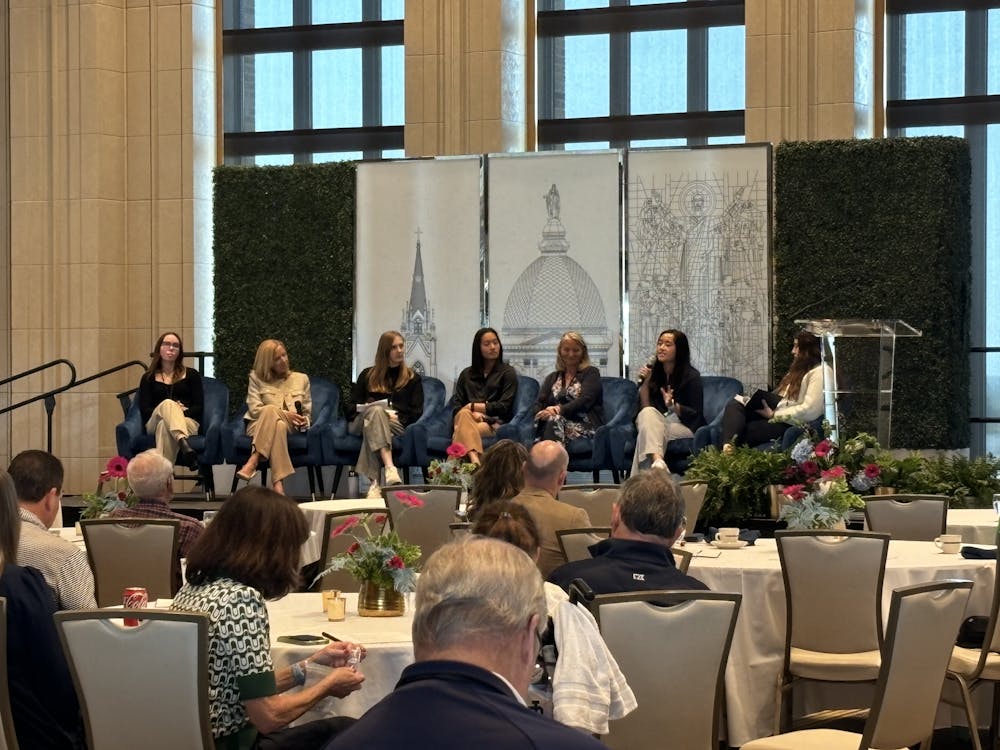On Oct. 11, Notre Dame hosted its fourth annual Rare Disease Patient Advocacy Summit in Dahnke Ballroom. The summit featured a series of talks presented by patients, family members and patient advocates who all focused on the importance of rare disease awareness.
Barbara Calhoun, the Reisenauer family director for patient advocacy education and outreach, and Katrina Conrad, the program manager for the Advocacy Education and Outreach Initiative, organized the summit. According to staff workers, 250 guests were reportedly registered for the event.
The summit itself was split into a series of eight talks, each with a separate focus in relation to rare disease. Talks were given by both adult and student advocates within the Notre Dame community. “Real Stories, Real Impact,” one of the eight sessions, featured three speakers who all shared their perspective as a parent of a child with a rare disease.
Chris Ostertag, clinical ethicist at Intermountain Health and board chair of the Global Foundation for Peroxisomal Disorders, was one of the speakers for “Real Stories, Real Impact.” Ostertag shared his story as the father of the late Hans, who had Zellweger spectrum disorder.
“Hans had seizures, a feeding tube, liver disease and global developmental delays,” Ostertag shared. “Hans was such a happy little guy early in his life. You would always hear him kind of battling about and laughing in the back.”
Last year, Hans died at the age of five. Despite the tangible pain of losing a child, Ostertag emphasized the importance of using Han’s story to shine a brighter light on rare disease and to develop a community with patients through events such as this.
“It's a family you never want to have, but it's a family you need more than ever,” Ostertag explained. “You don't have to filter things, [because] there's a shared understanding, and [you can] just air things out that among others, even your own family, would be uncomfortable. We were just so grateful to have this family.”
In addition to the community founded around rare disease, other speakers spoke about how their personal experience with rare disease pushed them towards public policy and patient advocacy. Sarita Edwards, CEO and president of E.WE Foundation, a global healthcare advocacy organization, spoke on this.
Edwards vocalized her journey as a patient advocate for her son Elijah whose diagnosis with Trisomy 18 led her to start a foundation that supports families dealing with the rare disease. She noted her personal struggles as a parent of a child with Trisomy 18.
“We were told, ‘enjoy your time, that [Elijah] would probably die soon,’” Edwards said. “When the healthcare system tells you your child is not worth medical resources, something activates in you.”
Since then, Edwards has used the E.WE foundation to encourage more individualized dialogue that goes beyond the science for rare disease patients. However, Edwards’s road to patient advocacy has not been a straightforward path, and she shared her difficult beginning and provided advice for other individuals interested in patient advocacy.
“I didn't choose to tell our story in the beginning, [because] that made it too real for me,” Edwards said. “But when I saw that there was a need to, I saw that the healthcare and state legislators need to know that children with this diagnosis are living past what the science says. Advocacy starts with exploring what you want from your advocacy efforts and then connecting with a group of people that can help you reach those goals.”
With a focus on both advocacy and community development, the summit provided an intimate opportunity for not only the speakers to voice their perspectives but also for the audience members to speak. One individual, Kristin Meyer, is the mother to 3-year-old Noah who was diagnosed with a rare genetic mutation just six weeks ago. When discussing her feelings as a mother, Meyer shared how the rare disease community has impacted her family throughout this experience.
“This has been the most challenging six weeks of our lives,” Meyer said. “We have no idea what the future holds. Us being vulnerable enough to open up what we’re going through with Noah has allowed our friends to be vulnerable with us.”
With the conclusion of the summit, the speakers and advocates encouraged students to increase their curiosity when learning more about rare disease. Aside from increasing awareness for rare disease, they hope this summit will also increase students' empathy when regarding patients with rare diseases.
“The mascot for rare disease is the zebra,” Ostertag said. “There's this old saying that if you hear hoof beats, think horses. But zebras have hooves as well. It's not the everyday thing, it's the rare thing.”
Ostertag continued, “In medicine and healthcare, we're so compartmentalized. We're so focused on our specific organ system or symptoms. But I think no matter how specialized you get, just never lose sight of the whole patient and the whole family.”










